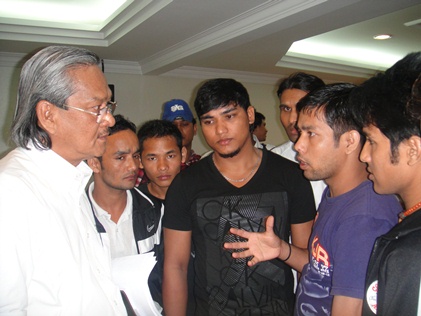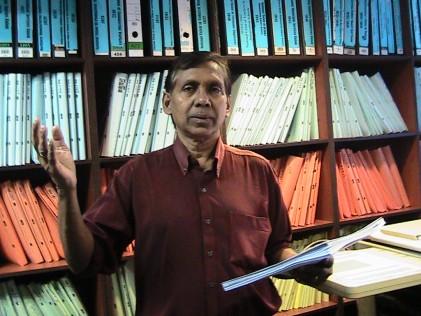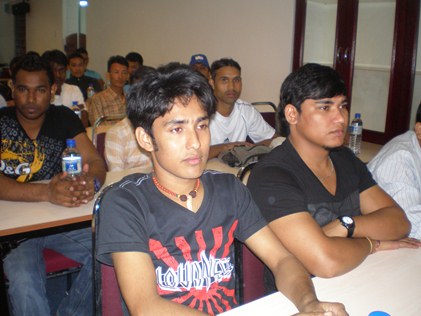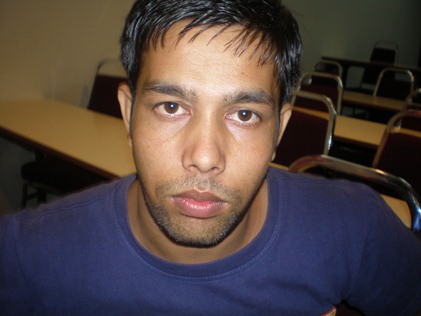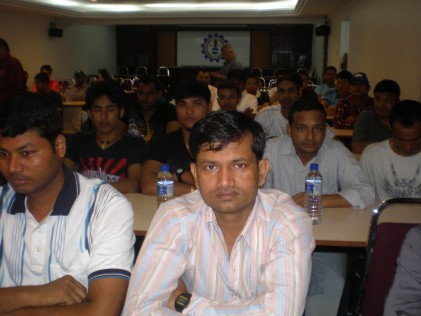Joint
Statement- 5/2/2013 (now 75)
MINIMUM WAGES FOR ALL WORKERS,
INCLUDING MIGRANT WORKERS
- No to Wage Deduction to recover Levy
Payable By Employers -
We,
the undersigned 75 civil society
organizations, trade unions and groups are shocked with the recent decision of
the Malaysian cabinet on 30/1/2013 to allow employers of migrant workers to
recover levy that they paid the government to employ foreign workers from
migrant workers through wage deductions.
According
to the law, workers in Malaysia were to receive minimum wages of RM900[USD291](for
Peninsular Malaysia) and RM800[USD259] (for Sabah and Sarawak) as of 1/1/2013.
Khalid Atan, the President of the Malaysian Trade Union Congress(MTUC) said,
“…if workers were asked to pay the levy, the minimum wages policy would not
benefit them at all, as whatever little increase in salary they enjoyed, would
be wiped out with the levy payment…” [Star,
10/1/2013, MTUC: Don't give in to employers' demand on foreign workers levy]
Some
employers have also been trying to avoid this obligation to pay minimum wages,
which is basic wages not inclusive overtime, existing allowances and other
benefits. Some do it by re-structuring worker remuneration by including all
other allowances, incentives and benefits to make up the RM900, which is very
wrong. Some employers are making employees to sign documents agreeing to these changes,
whereby this is made easier when there are no worker unions. Workers generally have
no avenue of complaint, or even choice in the matter especially when many now
are employed based on short-term employment contract. A refusal by the worker
means a non-renewal or no new employment contracts when their contracts expire.
To
avoid paying workers minimum wages, the Malaysian government also allowed
employers the right to apply for a delay in paying workers minimum wages, and
vide Minimum Wages(Amendment) Order 2012 dated 28/12/2012, the government allowed
more than 500 employers to delay paying workers minimum wages. What was
blatantly wrong in this process was that the aggrieved workers and/or their
unions were not given any right to be heard before the employer’s application
to deny them their entitlement to minimum wages was approved.
The
Malaysian government, in the past, on the application of certain employers,
allowed them to make wage deductions and/or wage advances, contrary to the
general provisions in law with the intention to allow employers to recover from
migrant workers monies expended by employers to get migrant workers to Malaysia
to work for them. This included sometimes not just a means to recover levy
paid, but also all other costs incurred by employers to recruit and bring in
migrant workers. Approvals were given by the government with no consultation or
agreement of the worker or their unions. As of 1/4/2009, the Malaysian
government stopped this practice, and made it clear that it is employers that
have to pay the levy and they cannot recover the said sum from migrant workers.
Labour
Director-General Datuk Ismail Abdul Rahim was reported saying that, “…The
rationale behind getting employers to bear the levy was to discourage them from
employing foreigners…” [Star, 16/4/2009,
Employers can deduct levy from wages, again]. As such, this current move to
make migrant workers pay the levy removes the very intention of levy, i.e. to
discourage employers from employing foreign workers.
The
reason for the new decision ‘… is to alleviate the hiring cost for employers,
said Finance Minister II Datuk Seri Ahmad Husni
Hanadzlah...’ [Star, 30/1/2013,
Cabinet: Foreign workers to pay levy instead of employers with immediate
effect]. If the Malaysian government now wants to reduce the financial
burden of employers who hire migrant workers, then rightfully the government
should reduce or remove the levy – not shift the burden to workers.
Migrant
workers sacrifice a lot when they elect to come to Malaysia to work. They have
to leave behind the spouses, children, family and friends for Malaysian law
allows them to only come alone and work in Malaysia, and they also are barred
from falling in love and getting married during their employment period which is usually for at least 5 years. They
also end up incurring substantial debt when they come, for they have to pay,
amongst others recruitment agents, most times these payments include both legal
and ‘illegal’ payments. Whilst in Malaysia, they are bound to just one employer
– having no right to change employers.
When they claim rights, even through
existing legal avenues, they generally are terminated and their employment
pass/permits are also cancelled depriving them the right to stay (or work)
legally in Malaysia until their claims are resolved. The termination of these
passes/permits is done by the Malaysian government irrespective of whether
there are outstanding claims or pending cases concerning the said worker’s
rights.
This precarious reality of migrant workers makes them vulnerable to
exploitation by some employers, knowing that it is most easy to violate worker
rights and then get off scot free. Until laws and policies are amended to
protect migrant’s worker rights, naturally migrant workers become the preferred
choice over local workers as they are certainly a more easily exploited class
of workers.
We
call on the Malaysian government to immediately rescind the decision made by
the Malaysian cabinet on Wednesday(30/1/2013) to allow employers of migrant
workers to recover the levy they pay the government by deduction of wages of
migrant workers.
We
take the position that all workers, including migrant workers, are entitled to
receive minimum wages, whereby this is the basic wage and should not include
allowances, benefits and other work incentives. Employers should not be
permitted to remove pre-April 2012 worker entitlements and benefits, being the
date the Minimum Wage Order 2012 came into force, from existing and subsequent
employment contracts.
We call
on the Malaysian government to end all forms of discrimination against workers,
with regard to, amongst others, their nationality, gender, duration of their
employment contracts.
Charles
Hector
Pranom
Somwong
Syed
Shahir Syed Mohamud
For
and on behalf the 75 groups listed:
ALIRAN
Angkatan Rakyat Muda Parti Rakyat Malaysia (ARM-PRM)
Asian Migrant Centre (AMC), Hong Kong
Asian Migrants Coordinating Body (AMCB) Hong Kong
Asia Monitor Resource Centre, Hong Kong
Asia Pacific Forum on Women, Law And Development
(APWLD)
Asia Pacific Mission For Migrants (APMM ), Hong Kong
Association of Indonesian Migrant Worker in Hong
Kong (ATKI-HK)
Bangladeshi Ovibashi Mohila Sramik Association
(BOMSA)
Burma Campaign Malaysia
BWI (Building and Wood Worker's International)
CAW (Committee for Asian Women)
Centre for Human Rights and Development-Sri Lanka
Center for Orang
Asli Concerns (COAC), Malaysia
CEREAL - Centro de Reflexión y Acción Laboral –
Guadalajara, Mexico
Clean Clothes Campaign(
CCC )
Community Action Network (CAN), Malaysia
Community Development Services, Sri Lanka
COVA (Confederation of Voluntary Associations), India
Electronic
Industry Employees Union Western Region (EIEUWR), Malaysia
Far East Overseas Nepalese Association (FEONA), Hong
Kong
Filipino Migrant Workers Union (FMWU)
GoodElectronics Network
Human Rights Ambassador for Salem-News.com
IMA Research Foundation, Bangladesh
International Domestic Workers Network
Kesatuan
Pekerja-Pekerja Polyplastics Asia Pacific Sdn Bhd.
Kesatuan
Pekerja-Pekerja MHS Aviation Berhad
Kesatuan
Sekerja Industri Elektronik Wilayah Selatan (EIEUSR), Malaysia
LSCW (Legal Support for Children and Women),
Cambodia
MADPET (Malaysians Against Death Penalty and
Torture)
Malaysia Youth & Students Democratic Movement (DEMA)
MAP Foundation, Thailand
Migrant Domestic Workers Trust, India
Migrant Forum, India
Migrant Health Association in Korea
MIGRANTE International
Mindanao Migrants Center for Empowering Actions,
Inc. (MMCEAI)
Mission For Migrant Workers - Hong Kong
MTUC
(Malaysian Trade Union Congress)
Myanmar Ethnic Rohingyas Human Rights Organization
Malaysia (MERHROM)
National Domestic Workers Movement, India
National Union
of Transport Equipment & Allied Industries Workers (NUTEAIW)
Network of Action for Migrants in Malaysia (NAMM)
NLD-LA (National League for
Democracy-Liberated Areas), Malaysia
NUBE (National
Union of Banking Employees), Malaysia
OKUP (Ovibashi Karmi Unnayan Program) in Bangladesh
Parti Rakyat Malaysia(PRM)
Paper &
Paper Products Manufacturing Employees' Union Of Malaysia (PPPMEU)
Persatuan Sahabat Wanita, Selangor
Persatuan
Kesedaran Komuniti Selangor (EMPOWER)
Persatuan Masyarakat Selangor & Wilayah
Persekutuan (PERMAS)
PILAR (United Indonesians in Hong Kong against
Overcharging) , Hong Kong
Pusat KOMAS (KOMAS)
Saya Anak Bangsa Malaysia {SABM}
SUARAM, Malaysia
Tamilnadu Domestic Workers Union, India
Tamilnadu Domestic Workers Welfare Trust, India
Tenaganita, Malaysia
Transient Workers Count Too (TWC2), Singapore
United for Foreign Domestic Workers' Rights (UFDWR )
WAC, Philippines
WARBE Development Foundation-Bangladesh
Women Workers Lead
WH4C – Workers Hub For Change
Yayasan LINTAS NUSA - Batam – Indonesia
Solidaritas Perempuan (SP) / Women's Solidarity for
Human Rights, Indonesia
SEWA (Self Employed Women’s Association), India
Electronic
Industry Employees Union Eastern
Region(EIEUER), Malaysia[KSIEWTSM]
MakeITFair
Nepal Labour Journalists' Association
Migrant Care,
Indonesia
CIMS (Centre for Indian Migrant's Studies)
United Filipinos in Hong Kong (UNIFIL-MIGRANTE-HK)
Kav LaOved – Protecting Workers' Rights
--
